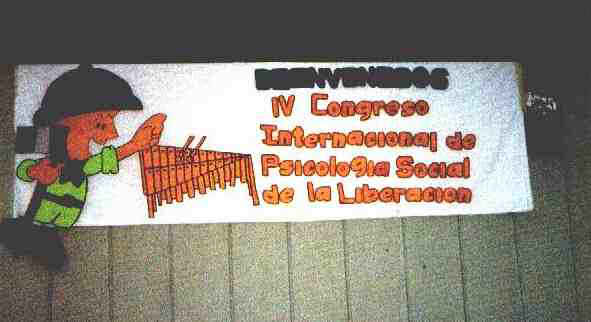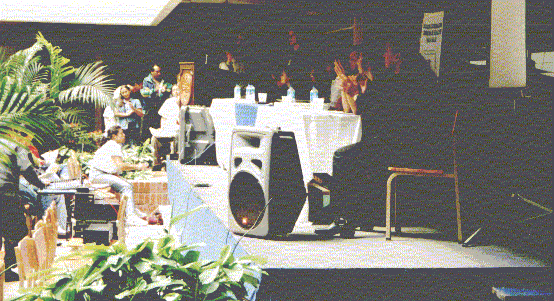
Universidad de San Carlos de Guatemala: Guatemala
City, 13-15 November, 2001.

This was the fourth annual conference held by a network of Latin American social psychologists that focuses on psicología social de la liberación - which could be translated as both 'liberation social psychology' and 'social psychology of liberation'. This field of work has been concerned with the particular issues facing the poor and oppressed of those countries to the south of the Rio Bravo/Rio Grande, and the response of social psychology to their situation, their aspirations, their struggle, although it has a much wider relevance. It draws heavily on the works of the late Ignacio Martín-Baró, murdered in 1989 together with 5 other Jesuits and two female colleagues at the Universidad de Centro América, José Siméon Cañas, San Salvador, by the Salvadorian armed forces (trained by the US military at the School of the Americas,Galeano, 1998). Martín-Baró was concerned to develop a social psychology adequate to the situation of the poor in his adopted country, and to do so he used the rich resources of the field of social psychology, simultaneously subjecting it to a critique for its individualism, scientism, and culturally specific context of origin (but pretension to universal applicability). Martín-Baró's work, like that presented at the conference was both theoretically sophisticated and at the same time practically grounded in work with oppressed and marginalised populations. (See Martín-Baró, 1983, 1989, 1994, 1996).
The conference was held at the University of San
Carlos, Guatemala City. The genocide of the 1980s and early 90s (some 70,000
indigenous Maya Guatemalans died during that US sponsored military campaign)
and the disappearances of trade unionists, academics, students, human rights
activists and others over a more extended period, were very much an active
part of the context. The conference began and ended with a Maya fire ceremony,
and the sessions started with presentations by representatives of various
Guatemalan social movements, from that for widows of the disapperared,
returned refugees in the Ixcan region, indigenous groups, to trade unionists
and campesino co-operative organisations, as well as womens' and gay rights
organisations.
 There
was also an impressive talk by Horacio Martins de Carvalho from the Brazilian
Landless Workers Movement (MST) which covered the nature of the struggle
for social justice, land occupations and the new democratic communities
that have arisen, together with the cultural practices that have evloved
to support the struggle. This effectively framed the conference within
the problematic of what psychology can contribute, and what kind of psychological
knowledge and practice is appropriate. The rest of the conference was organised
with workshop sessions and plenary papers organised around three key themes:
There
was also an impressive talk by Horacio Martins de Carvalho from the Brazilian
Landless Workers Movement (MST) which covered the nature of the struggle
for social justice, land occupations and the new democratic communities
that have arisen, together with the cultural practices that have evloved
to support the struggle. This effectively framed the conference within
the problematic of what psychology can contribute, and what kind of psychological
knowledge and practice is appropriate. The rest of the conference was organised
with workshop sessions and plenary papers organised around three key themes:
| A psychology of liberation requires a prior liberation of psychology, and that liberation can only come from a praxis committed to the sufferings and hopes of the people. Martín-Baró, 1996 p. 32 |
Galeano, E. (1998) Patas Arriba: La Escuela del Mundo al Revés. Madrid: Siglo XXI. (Note an English edition has now appeared - NY: Seven Stories)
Martín-Baró, I. (1983): Acción e Ideología: Psicología social desde Centroamérica I. San Salvador, UCA Editores.
Martín-Baró, I. (1989) Sistema, Grupo y Poder: Psicología social desde Centroamérica II. San Salvador, UCA Editores.
Martín-Baró, I. (1994) Psicología de la Liberación. Edited by A Blanco, Madrid: Trotta. (with epilogue by N. Chomsky).
Martín-Baró, I. (1996) Readings for a Liberation Psychology. Edited by A. Aron and S. Corne, New York: Harvard University Press.
UCA website: Ignacio Martín-Baró y la Psicología de la Liberación (Spanish - some English links)